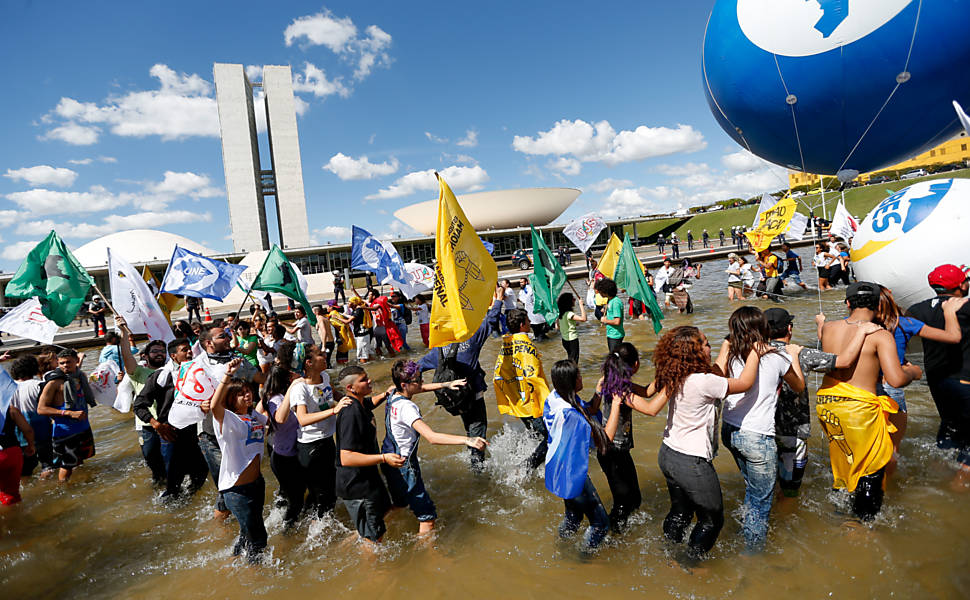Latest Photo Galleries
Brazilian Markets
17h38 Bovespa |
+1,50% | 126.526 |
16h43 Gold |
0,00% | 117 |
17h00 Dollar |
-0,93% | 5,1156 |
16h30 Euro |
+0,49% | 2,65250 |
ADVERTISING
In Tight Decision, Brazil's Chamber of Deputies Rejects Reduction in the Age of Criminal Responsibility
07/01/2015 - 11h31
Advertising
MARIANA HAUBERT
NATÁLIA CANCIAN
FROM BRASÍLIA
After a huge task force led by the government and parliamentarians linked to human rights, the Chamber of Deputies rejected early on Wednesday (1st) the proposed amendment to the Constitution that reduces the age of criminal responsibility from 18 to 16 for serious crimes by just five votes.
In a tight decision, 303 lawmakers voted in favour of the bill, 184 voted against and 3 abstained. Although the majority of votes were in favour of the reduction, the Chamber's rules require a proposed amendment to the Constitution has a minimum of 308 votes to be approved.
Even with the rejection of the project, the original bill, which reduces the age of criminal responsibility not only for serious crimes, but for any kind of crime, can still be voted in the plenary. According to the President of the Chamber, Eduardo Cunha (PMDB-RJ), this should happen only next week or it could be postponed for the second semester.
The project rejected this Wednesday (1) was led by Cunha himself, who speeded up the voting.
The bill aimed to amend the Constitution to lower the age of criminal responsibility from 18 to 16 years for heinous crimes (such as rape and robbery with murder) and others like drug trafficking, murder (when there is intent to kill), burglary (when there is use of a firearm, for example) and grievous bodily harm that can be followed by death.
Cunha had the support from Evangelical groups and politicians linked to the arms industry and policemen as well as from part of the opposition (as PSDB and DEM).
The Workers' Party, PSB, PDT, PC do B, Pros, PPS, PV and Psol recommended their members voted against the bill.
Dilma Rousseff's and the Worker's Party took action to convince the allies to reject the amendment. During the morning, leaders of the allies met Minister of Justice José Eduardo Cardozo and Human Rights Minister Pepe Vargas at the Ministry of Justice's building.
Cardozo said the approval would be an "atomic bomb" on the prison system and could lead to changes in other laws, such as the permission to drive.
In recent months, the government has been highlighting the statistics on juvenile crime in an attempt to influence public opinion against the reduction of the age of criminal responsibility.
Moreover, it began defending changes in the Child and Adolescent Statute (ECA) only, to increase the punishment for minors who engage in violent crime and for adults who induct young people.
To ensure the discussion on the voting would not be extended into dawn, it was agreed that 10 lawmakers spoke against it and other 10 in favour. Yet, the discussion and the voting took more than four hours.
Politicians linked to the arms industry and policemen as well as others who advocated the reduction of criminal responsibility age, climbed the President's table area to check the end of the voting process.
After the result, demonstrators opposed to the bill celebrated in the Chamber plenary gallery while shouting "no, no, no to the reduction" and "Cunha dictator".
"We are lawmakers, not avengers. It is an ineffective measure and affects the black, poor, excluded population, "said deputy Ivan Valente (Psol-SP).
"This bill could put the youngsters in the way of crime, drugs and pedophilia", criticized the leader of the Workers' Party, Sibá Machado (AC).
Those who wanted the reduction of criminal responsibility age justified their opinion by claiming that currently most of the crimes in the country are committed by persons under 18, who are often used by adults. "One who kidnaps, tortures and kills is not a kid, is criminal," said Marcos Rogério (PDT-RO).
"The ECA [Child and Adolescent Statute] is weak, doesn't punish, so much so that after reaching the age of criminal responsibility, this delinquent has clean records regardless of the barbarians crimes he committed," said deputy Captain Augusto (PR-SP).
The session that lasted about four hours was preceded by turmoil and calls for order to reduce the outbursts from the audience against and in favour of the bill.
Translated by JULIANA CALDERARI




